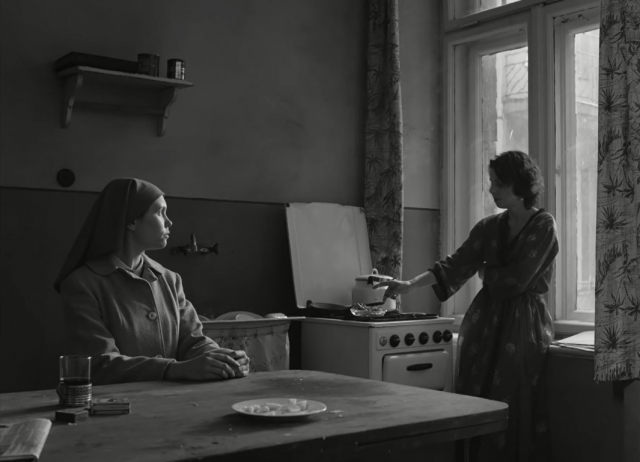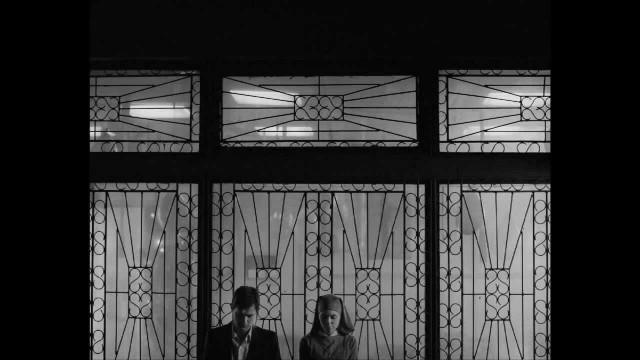
Ida (Agata Trzebuchowska) learns surprising things about her family from her aunt Wanda (Agata Kulesza) in IDA
IDA (Paweł Pawlikowski, 2013)
Cinema Village
22 East 12th St. between University Pl. & Fifth Ave.
212-924-3363
www.cinemavillage.com
www.musicboxfilms.com
 Paweł Pawlikowski’s Ida is one of the most gorgeously photographed, beautifully told films of the young century. The international festival favorite and shortlisted Foreign Language Oscar contender is set in Poland in 1962, as eighteen-year-old novitiate Anna (Agata Trzebuchowska) is preparing to become a nun and dedicate her life to Christ. But the Mother Superior (Halina Skoczyńska) tells Anna, an orphan who was raised in the convent, that she actually has a living relative, an aunt whom she should visit before taking her vows. So Anna sets off by herself to see her aunt Wanda (Agata Kulesza), a drinking, smoking, sexually promiscuous, and deeply bitter woman who explains to Ida that her real name is Ida Lebenstein and that she is in fact Jewish — and then reveals what happened to her family. Soon Ida, Wanda, and hitchhiking jazz saxophonist Dawid Ogrodnik are on their way to discovering some unsettling truths about the past.
Paweł Pawlikowski’s Ida is one of the most gorgeously photographed, beautifully told films of the young century. The international festival favorite and shortlisted Foreign Language Oscar contender is set in Poland in 1962, as eighteen-year-old novitiate Anna (Agata Trzebuchowska) is preparing to become a nun and dedicate her life to Christ. But the Mother Superior (Halina Skoczyńska) tells Anna, an orphan who was raised in the convent, that she actually has a living relative, an aunt whom she should visit before taking her vows. So Anna sets off by herself to see her aunt Wanda (Agata Kulesza), a drinking, smoking, sexually promiscuous, and deeply bitter woman who explains to Ida that her real name is Ida Lebenstein and that she is in fact Jewish — and then reveals what happened to her family. Soon Ida, Wanda, and hitchhiking jazz saxophonist Dawid Ogrodnik are on their way to discovering some unsettling truths about the past.

Lis (Dawid Ogrodnik) and Ida (Agata Trzebuchowska) discuss life and loss in beautifully photographed IDA
Polish-born writer-director Pawlikowski (Last Resort, My Summer of Love), who lived and worked in the UK for more than thirty years before moving back to his native country to make Ida, composes each shot of the black-and-white film as if it’s a classic European painting, with cinematographers Łukasz Żal and Ryszard Lenczewski’s camera remaining static for nearly every scene. Pawlikowski often frames shots keeping the characters off to the side or, most dramatically, at the bottom of the frame, like they are barely there as they try to find their way in life. (At these moments, the subtitles jump to the top of the screen so as not to block the characters’ expressions.) Kulesza (Róża) is exceptional as the emotionally unpredictable Wanda, who has buried herself so deep in secrets that she might not be able to dig herself out. And in her first film, Trzebuchowska — who was discovered in a Warsaw café by Polish director Małgorzata Szumowska — is absolutely mesmerizing, her headpiece hiding her hair and ears, leaving the audience to focus only on her stunning eyes and round face, filled with a calm mystery that shifts ever so subtly as she learns more and more about her family, and herself. It’s like she’s stepped right out of a Vermeer painting and into a world she never knew existed. The screenplay, written by Pawlikowski and theater and television writer Rebecca Lenkiewicz, keeps the dialogue to a minimum, allowing the stark visuals and superb acting to heighten the intensity. Ida is an exquisite film whose dazzling grace cannot be overstated.